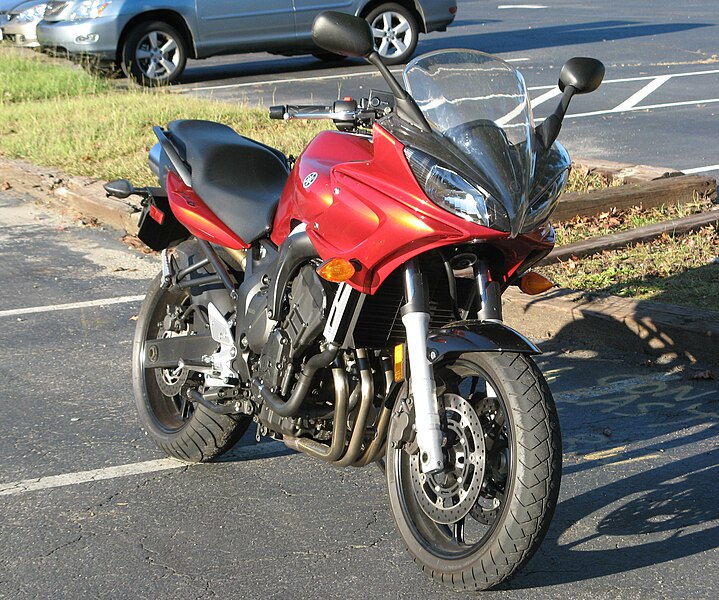Now we are halfway through February and morning temperatures are up to 5C so my engine is back. The Fazer needed some fuel so I pulled into the fuel station and I did a double take when I saw that the person before me had bought £84 of fuel ! Wow, that is a lot of money. The price per litre was 129p. I started to number crunch and I calculated that my motorbike, which does around 60mpg, is now costing 15p per mile in fuel. On the route I take, that's £3 to get to work and back. I can see why some people are grumbling about the fuel prices.
 |
| A Yamaha FZ6 Fazer |
I started to wonder how this compared to the costs of cycling. I'll skip over maintenance, annual costs and depreciation, the bicycle wins hands down, so I'll just concentrate of fuel.
Cycling does take real personal effort. My shortest cycling route to work is 14 miles round trip, taking about 50 minutes and 500 calories of effort. That's the price of your average off-the-shelf sandwich which costs £2 to £3. That's 15p to 30p a mile. That fuel is no cheaper than my 600cc motorcycle. Hmm, the price of petrol is not looking so expensive any more.
Since I started cycling more, I have changed my relationship with food. Without exercise, food is necessary but you spend a lot time wondering about how to minimse your calorie intake. On a long cycle, food starts to become a fuel and you worry about how much you are putting in the tank and what the quality is like.
I once read about a long distance cyclist who fuelled himself across continents on coffee and doughnuts due to their low cost (calories per dollar). I've also read the biography of Ranulph Fiennes, the polar explorer, who carried his calories in the form of butter because it was the lightest and most compact way to carry them. He was burning 10000+ calories a day, dragging several months of food with him.
Ever since, I often find myself looking at the labels on the back of pre-packed sandwiches scoffing at the extorionate calories per £ cost of the healthy range. Why would you spend £3 to get 300 calories when you can get 600 ?
So, be careful what fuel yourself with, it might not be as cheap as you think. My personal favourite cheap fuel is a supermarket branded packet of Fig Rolls - 34p gets you 900 calories of yummy fuel.
 |
| The Fig Roll (aka Fig Newton) |
At the other end of the scale, you might not want to fill yourself with Junk Food. Have a read here for a few ideas for fuel:
Ultracycling: Eating on self-supported all-day rides
Seeing how much effort and fuel is required to move a single person across the land, it seems truly bonkers that the most common way to transport one person to their place of work is inside a 1500kg metal box. Try pushing a car when it has broken down and it makes you realise how much valuable energy we are wasting.
No comments:
Post a Comment